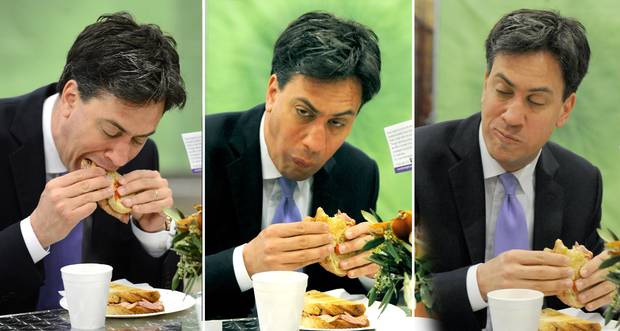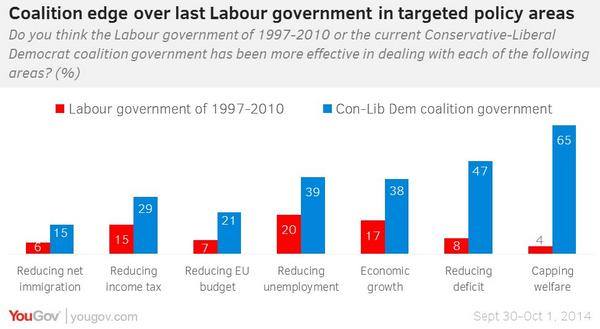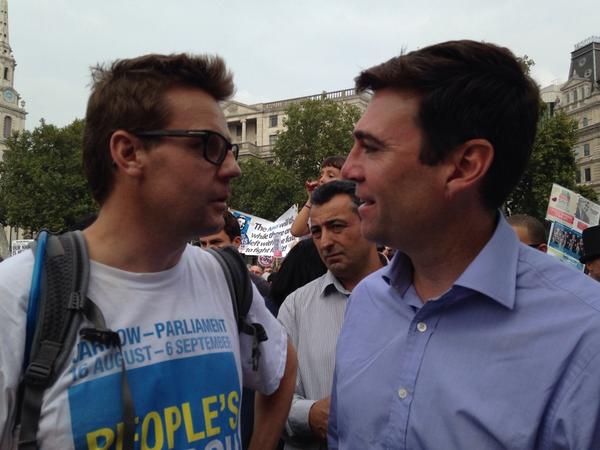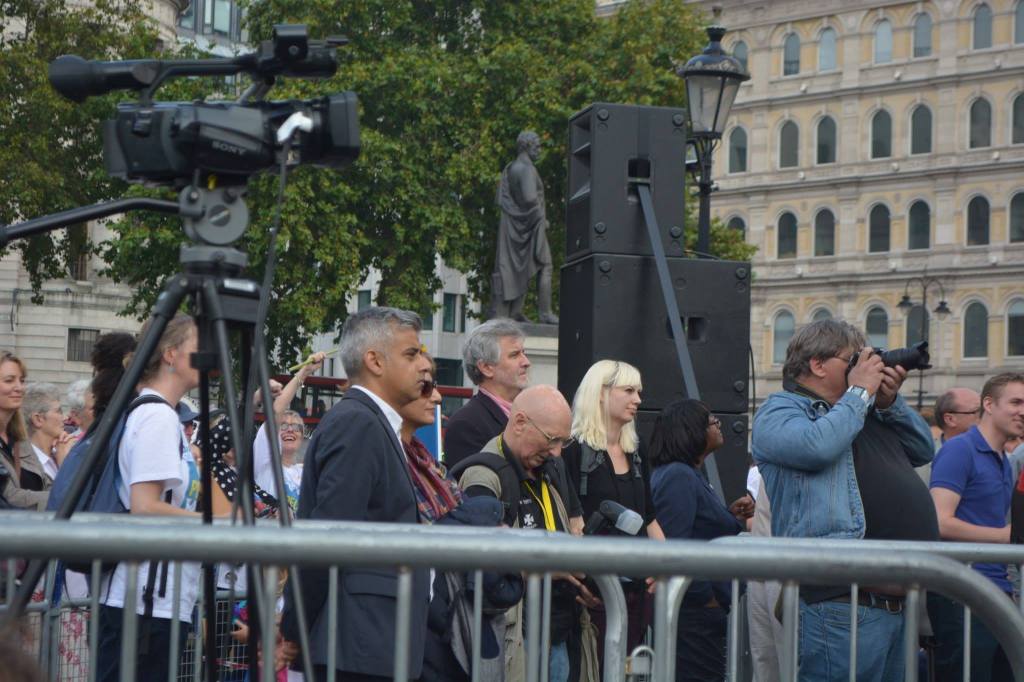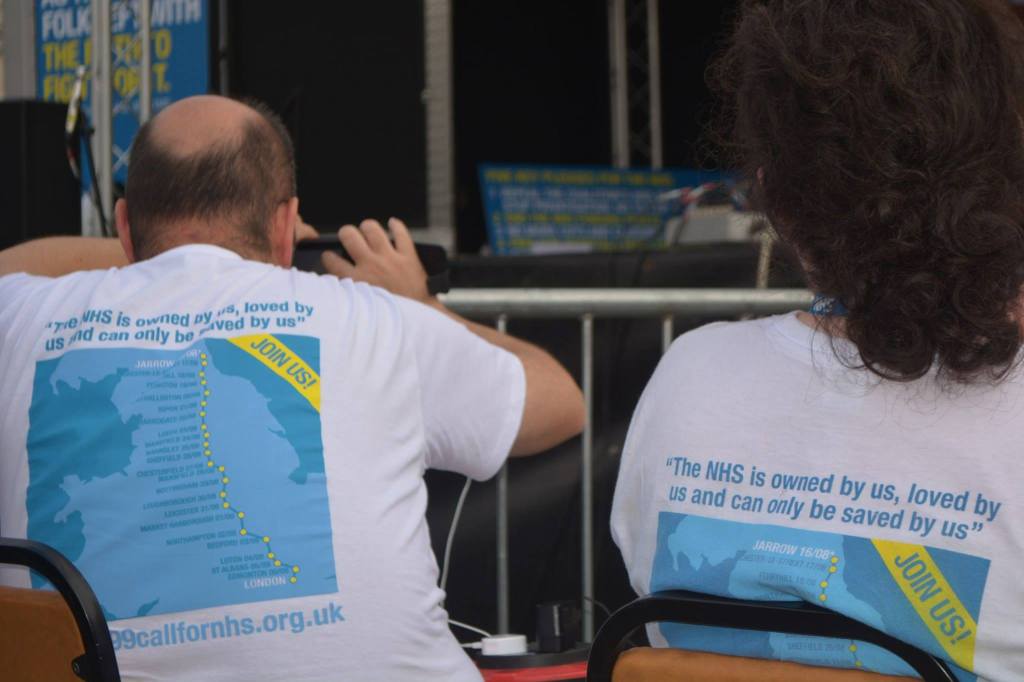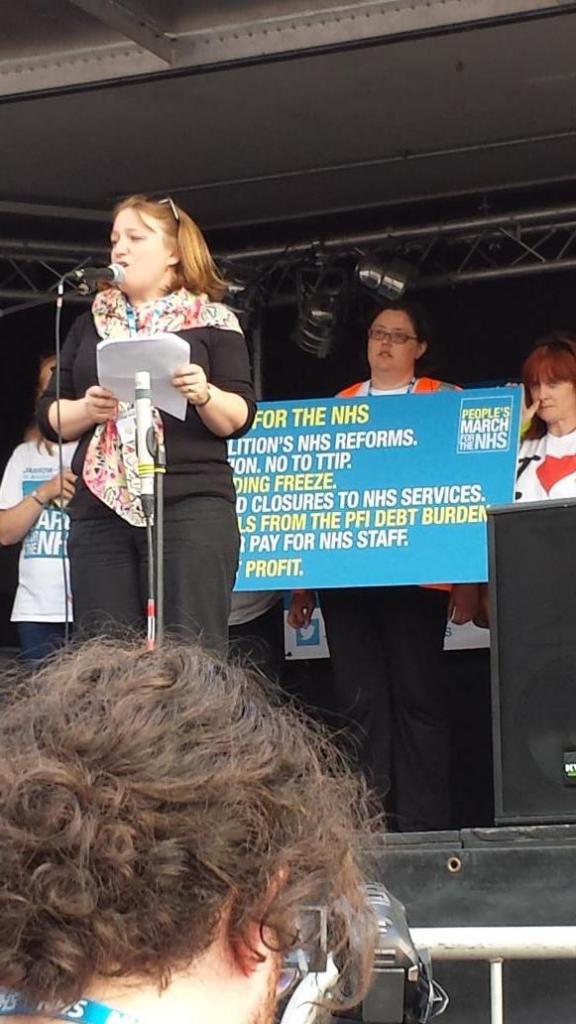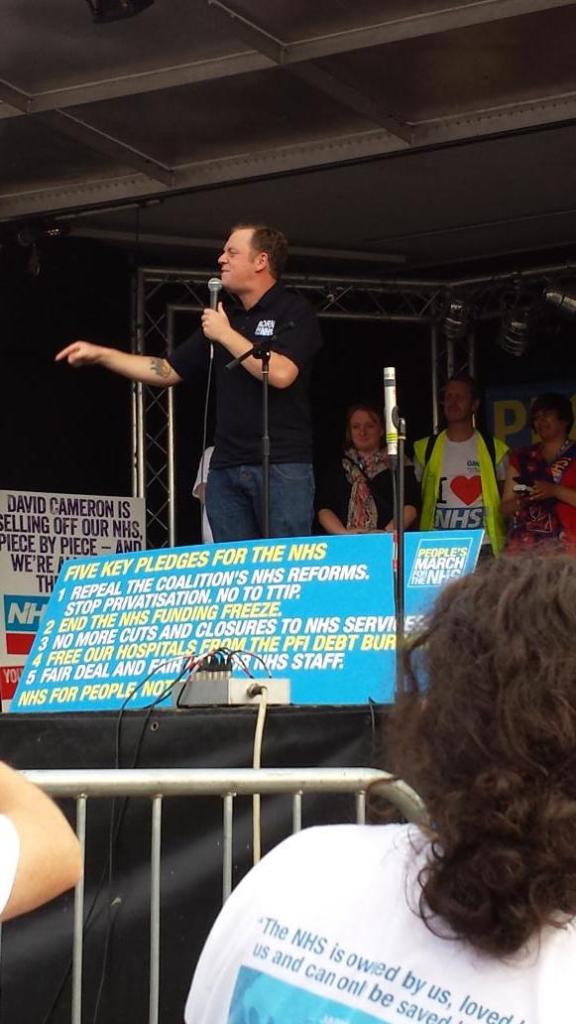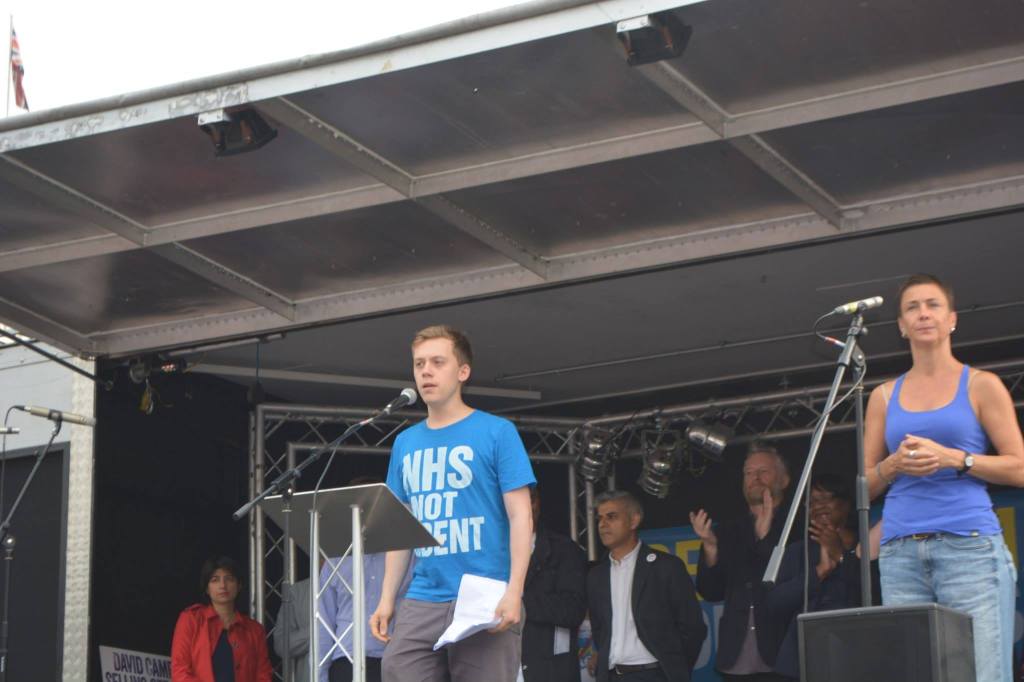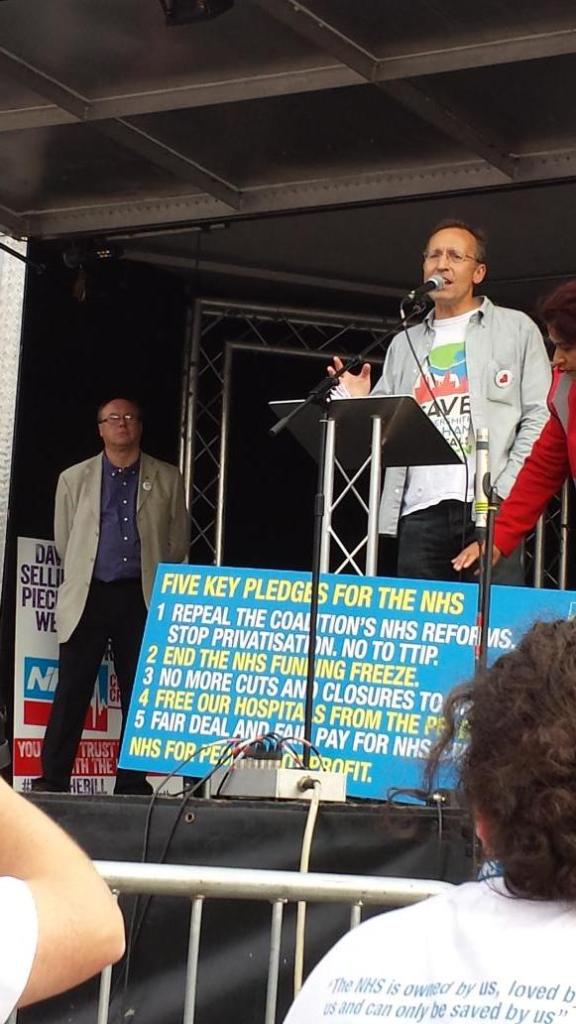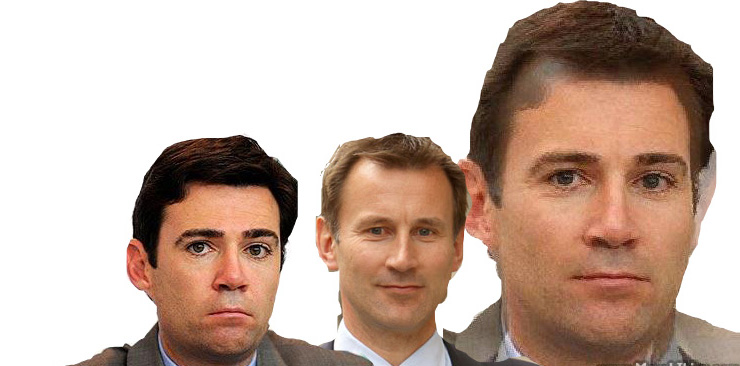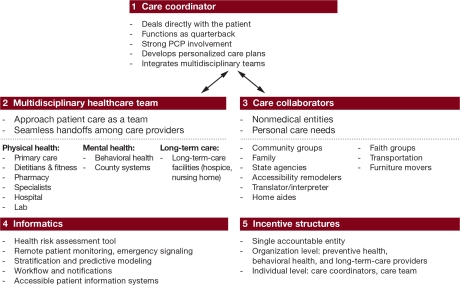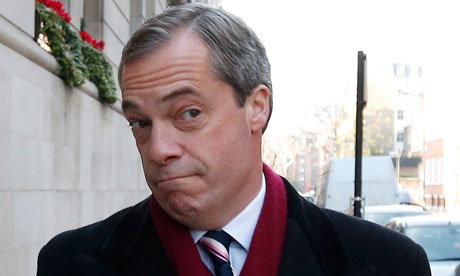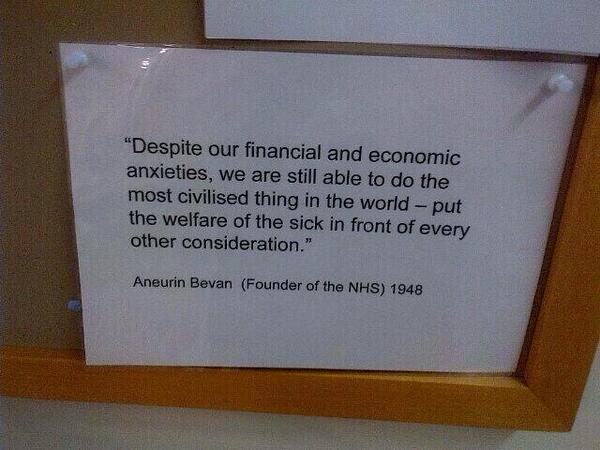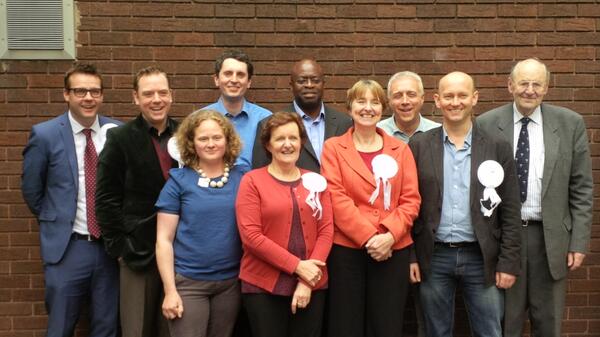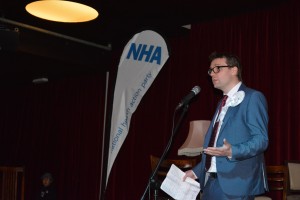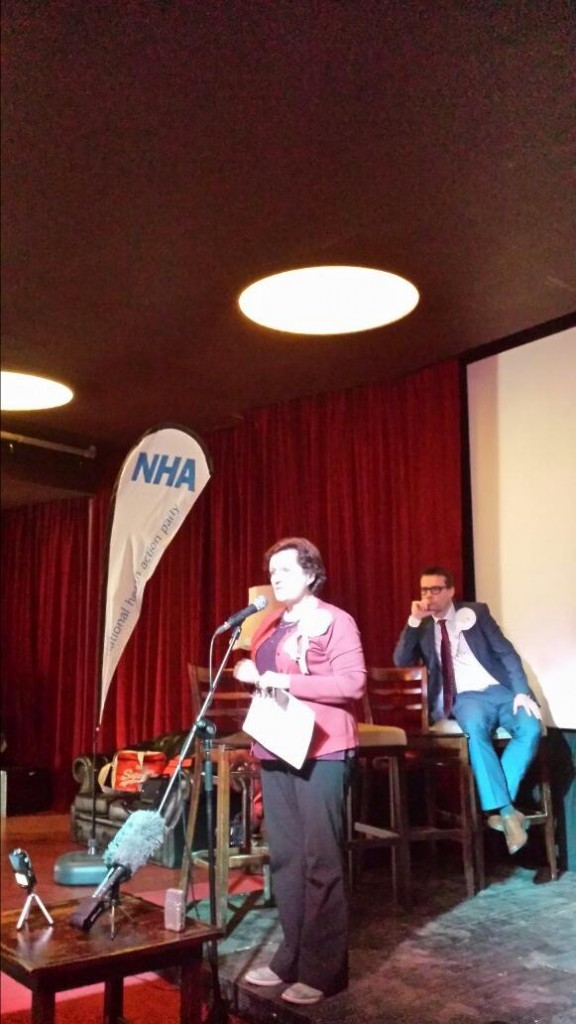Home » Posts tagged 'labour'
Tag Archives: labour
NHS “credibility gap”
The Conservatives have overtaken Labour for the first time since March 2012 in the latest YouGov/The Sun poll.
David Cameron has an inherent advantage in the public perception’s of his leadership qualities, in that he is doing the job every day and being seen to do so on the news. Credibility is an important currency. And Labour has already stated ‘the market went too far’ in the NHS. It is not a secret that many parts of the media try to present Ed Miliband in a negative light. Labour is trusted on the NHS, and the Tories are trusted on the economy; so a rationale strategy for the Tories is to make the link between the country’s economy and the NHS. However, real-terms NHS funding has effectively flatlined for a number of years now, not keeping up with the inflation in the system, and debt under this Government has got out of control.
For example, you’re more likely to get a discussion of the ‘bacon butty’ incident than a discussion of how NHS contracts have been aggressively been promoted to the private sector, or how the Health and Social Care Act (2012) locks in the market.
The Prime Minister often blames this lack of coverage on the era of the rolling news, but conversations in the social media have been very productive in exposing events which the BBC would rather not cover. David Cameron’s segment on the NHS was certainly passionate. Cameron must have been distraught at the closure of the Cheyne Centre which he had once fought to keep alive.
But actions speak louder than words. When Cameron claims he will protect the NHS he doesn’t say from whom or what he needs to protect it. He no longer talks about the importance of competition in the NHS and many of the initiatives associated with Andrew Lansley seem to have been quietly forgotten.
If David Cameron had wanted to win the trust of the medical profession, he would not have ambushed them out of nowhere with a ‘top down reorganisation’ which he promised would never happen. The £2.4 bn reorganisation is widely considered to be a tragic waste, when money could have, and should have, been invested in frontline services. The chunk of the speech on the NHS was little consolation to hardworking nurses who’ve witnessed yet another pay freeze, despite the economy’s performance recovering. Nurses, part of the lifeblood of the service, are not immune from the ‘cost of living crisis’, particularly if they are living in London and working in one of the powerhouse teaching hospitals.
A&E targets have been consistently missed during the duration of this period of office by the Conservative Party (and the Liberal Democrat Party).
The current Government need to address what to do about the ‘private finance initiative’. New contracts have been awarded during the lifetime of this Government, and, whilst they were undoubtedly popular under New Labour, their origin is clearly found in the John Major Conservative administration of 1992-1997.
David Cameron, in his conference speech, simply behaved so passionately about the NHS as if the Lewisham debacle had never happened. The current Government even spent money trying to win the case in the Court of Appeal.
GP waiting times have been an unmitigated disaster under this Government. There has been a marked rise in the number of NHS trusts in deficit. Jeremy Hunt is stuck in a time warp. He mentions Mid Staffs at every opportunity. Hunt, completely disingenuously, does not let the failures in culture, quality or management, identified at the CQC, soil his lips. The “Keogh Trusts” were dealt with due to failings which had occurred in the lifetime of and due to this government.
Like the referendum on Europe, promising ‘to protect’ the NHS could be ‘jam tomorrow‘, if the Conservative Party fail to get re-elected. It is either a sign of confidence, or sheer arrogance, that David Cameron and colleagues can hang these uncoated promises in thin air.
The position in an editorial of the Financial Times is clear – and damning:
“But in the bid both to draw a clear dividing line with Labour and reassure the wavering right, they have staked out a fiscal position that is neither sober nor realistic.”
And, hard though it might be to swallow, the Coalition appears to have an ‘edge’ on some key policy areas.
Labour would never have been able to get away with such dodgy promises, with their plans for government being watched like a hawk. With the help of the BBC and other supine media outlets, rather, there will be an inadequate scrutiny of these Conservative plans, which hopefully will be better articulated before the time of the election. As such, it does not matter what Labour promises its voters on the abolition of the purchaser-provider split, whole person care, the private finance initiative, reconfiguration of hospitals, GP waiting times, patient safety, and so on, if voters wish to vote for ‘jam tomorrow’.
The hope is that a Secretary of State for a Labour government would be able to untangle the UK government out of TTIP and CETA trade agreements further giving propulsion to neoliberal forces attacking the NHS. There is a hope that health and care finances will be properly funded in the next Government. All parties have arguably failed to have this conversation with the general public thus far.
Some policies of the current Conservative-led administration are incredibly unpopular with Labour voters: e.g. welfare benefits, NHS privatisation, repeal of the Human Rights Act. The feeling of many, currently, is that, while they do not particularly like this Government, they do not wish to vote for Labour which appears to be offering a diluted form of what the Conservative Party is offering. This is not in any way a indictment of the sterling efforts of the Labour Party Shadow Health Team.
But, before Labour attempts to plug the ‘funding gap’, it will need to resolve any ‘credibility gap’ first.
What is Clive telling Andy and does Andy need to listen?
I had the pleasure of going to two events at the weekend. On Saturday, I went to the event at Trafalgar Square for the #999CallfortheNHS #DarloMums arriving after their 300 mile-long walk across the country. Thanks to Jos Bell for inviting me, for which I am deeply grateful. The following day, I went to the National Health Action Party for their Annual Conference in Conway Hall, Red Lion Square, London. I enjoyed that afternoon as well.
The National Health Action Party are putting up parliamentary candidates for the General Election 2015, the vast majority of whom are known friends of mine. I am proud of them, and I really do wish them well. They give people a chance to vote for a party which has an established position against privatisation. The party is led by Dr Clive Peedell and Dr Richard Taylor, and they clearly have a strong position against privatisation of the NHS, and various manifestations of the NHS market including the private finance initiative and the EU-US free trade treaty.
They have made substantial progress this year. One of their challenges as a new party is having people recognise what they stand for, and this is clearly going to be hampered if the mainstream media do not give them a fair opportunity. Nonetheless, there have been noteworthy successes, such as appearances on Sky, LBC and “The Evening Standard”. And there is no doubt about the intensity of emotion in support of the National Health Service. A challenge is funding, and, whilst the party is in fact running a healthy surplus, having more funds will allow them to present a greater number of election candidates; an inevitably costly process.
It was very nice to chat with Dr Clive Peedell both before and after the event. I understand the misgivings about previous Labour policy, and indeed whether Labour can be said to be doing enough on abolishing the market. There are clearly strands of Labour policy which made room for private providers, but likewise it is also the case that the Lewisham judgment in the high court clearly stated that legislation under the present Government had been a clear departure from previous law under the last Labour government.
So it is not a surprise that many of the key pledges of the National Health Action Party will also be of concerns of some Labour voters with a keen interest in NHS policy. A slide of these were presented yesterday.
It is easy to underestimate the pernicious effect that the private finance initiative has had. Whilst it may have had good intentions of improving the infrastructure of the health service, one cannot deny how ‘cost savings’ allegedly in places have led to dangerous threats to patient safety, such as hospital infection, or in actual staffing numbers cannot be tolerated, not least by the general public and the clinical regulators. Whilst not all the problems can be held responsible from that desk behind Whitehall, the removal of the Secretary of State’s duty for the NHS is clearly symbolic. And Clive Efford MP perhaps would do well to learn from Peter Roderick, a public interest lawyer by training, and Prof Allyson Pollock, a world respected expert in public health.
Andy Burnham MP undoubtedly has a lot of goodwill too, and it is now likely that Labour will be the largest party of an incoming government at least under the leadership of Ed Miliband; they could win an outright majority, also, if the policy mix is right. Burnham has explicitly stated his desire to repeal the Health and Social Care Act (2012), but it is clear that a huge amount of work will be necessary to clear up the regimes for Trusts in financial distress, and for getting rid of competitive tendering tendering as being the default option.
It is not easy to let the Liberal Democrats ‘off the hook’, though it is clear that there are MPs such as Andrew George who have been strongly critical of the NHS reforms and indeed the “Bedroom Tax”. It is undoubtedly clear that the National Health Action Party will not be the main party forming Government next year, but they have never had aspirations to. They do allow the main political parties to be held to account, and their supporters are enthusiastic and well informed.
One of the critical tests for Labour will be letting go of the more neoliberal twangs to its policy, and to represent those people who had gone on the modern day NHS Jarrow march. It is not simply good enough to riposte every attack with ‘yeah but the NHS is free at the point of need’. There are genuine problems with solidarity, equity, justice, and comprehensiveness in current ethos, and a whole raft of problems which have arisen from indisputable marketisation and privatisation of the National Health Service.
It would be a mistake for Labour to discount the National Health Action Party as an insignificant blot on the landscape, when many of their concerns should be genuine concerns for Labour too. Andy Burnham is a highly skilled politician, but he has a strong vested interest in making a Labour government work properly for the NHS, and that might include for example not holding its staff to ransom yet again on a pay freeze. Andy as critical part of a Labour Government might wish to find a way to fund the NHS properly, especially since the economy is apparently making a recovery?
Whilst the present Coalition Government may seem ‘catastrophic’ to many of us, it has in fact been a blazing success for the Coalition parties. They have been able to do a lot of damage in the name of ‘austerity’. The evidence base for such policies is extremely poor, and indeed there is quite a lot of evidence that the welfare benefit ‘reforms’ have done a lot of damage to the mental health of citizens particularly those with disabilities.
Dr Clive Peedell has much to tell Andy, and – for what it’s worth – I do believe Andy needs to listen. And I have every confidence he will.
A triumph of optimism defeats cynicism as the Darlo Mums arrive in Trafalgar Square
The stench of sleaze from the backdoor lobbying culminating in the Health and Social Care Act (2012) was unable to overcome the sheer sense of euphoria and triumph of optimism defeating cynicism yesterday. Yesterday was history in the making, as all political parties were put on notice:
“Whose NHS is it? It’s our NHS”.
Whilst numerous governments have elaborated at length about the politics of ownership of public services, the message from the crowd of five thousand or so, within hearing distance of the Houses of Parliament, was loud and clear.
Many famous Labour members of parliament could be seen watching proceedings as the afternoon progressed, including Diane Abbot, Clive Efford, Jeremy Corbyn, Sadiq Khan, as pictured here.
It was a very sunny day here in Central London. There was a charged sense of energy, optimism and solidarity as about five thousand people attended a pro-NHS rally in Trafalgar Square, the culmination of a 300-mile march organised by a group of mothers from County Durham.
The group from Darlington, the Darlo Mums, are opposingthe privatisation of the NHS. It was very emotional when Rehana Azam announced the names of the Darlo Mums, “the most amazing people I’ve just spent the last three weeks with.”
The warmth of the #999CallfortheNHS campaign was evident throughout the whole afternoon. The event was immaculately organised, and was a thoroughly enjoyable event for all.
About 30 people had taken three weeks to march the full 300 miles from Jarrow in South Tyneside, organisers said.
Darlo Mums founder Joanna Adams said: “It’s been magic really. You only have to look over there [at the protesters gathered] to see people are behind the NHS and support what we’re saying. Joanna Adams described the mums as “ordinary”, but I beg to differ – they are entirely extraordinary in my opinion.
Andy Burnham MP, Shadow Secretary of State for Health, broke off all prior arrangements to attend, emphasising the indecency that would have occurred had he not come to represent the political party which had legislated for the birth of the NHS in 1945. Burnham’s speech was equally positive and optimistic about the future, speaking of the need to remedy public over privatisation, integration over fragmentation, people before profit, and collaboration over competition. Again, as is usual for Burnham who has great political gravitas, there was a sense of the current Government simply treading water in office until a person with substantial experience resumes office once again.
Burnham emphasised yet again that an incoming Labour government will repeal the Health and Social Care Act (2012) in its first Queen Speech, and said that it would then negotiate the UK out of TTIP, the transatlantic US-EU free trade treaty. Currently discussions are held in secret.
Sadiq Khan MP said the #Darlomums were the best England have had since 1966. As the MP for Tooting, Khan has been an ideal position to witness the effect the NHS changes have had on the nation’s capital.
Clive Efford MP described his Private Member’s Bill to repeal the damaging competition rules that the Tory-led Government inflicted on the NHS in its Health and Social Care Act 2012. The speech was very well received.
Even Dr Clive Peedell, Co-Chair of the NHS Action Party, called Andy Burnham’s speech “great”, having run 66 km himself to be there. It was announced that Dr Louise Irvine, an inner city GP and BMA council member, would be standing against Jeremy Hunt MP in the South West Surrey seat. Dr Peedell has of course seen at first hand the impact his specialty (oncology) has had on national politics, in the case of Aysha King.
And in the court of public opinion, according to the Daily Mirror last night, Dr Irvine was significantly more popular than Jeremy Hunt. We do know, of course, that the Daily Mirror do not comprise natural friends of Jeremy Hunt.
‘We keep on being told the NHS is unaffordable. THAT IS A LIE.”, said Rufus Hound. This lie has of course been one of the most powerful tools of the media who have called the consistent underfunding of services “unsustainable”.
Billy Bragg warned against blaming all cynicism on what one read in the media, saying that much cynicism was in people’s hearts – and this remained an obstacle for change.
Rehana Azam, as one of the marchers, NHS campaigner and leading light in GMB, and working mum, was one of the stars of yesterday’s event, explaining the necessary steps to get the NHS back on track.
Andy Slaughter, MP for Hammersmith and Fulham, recounted the demolition of his local NHS services, whilst Grahame Morris gave his account, as MP for Easington, of the fight against the Tories to protect the NHS. Andy Slaughter of course has a huge following in West London, and one of the key organisers of yesterday’s event Jos Bell was obviously pleased with the success of the event together with Andy Slaughter.
And finally, Question Musiq explained how he owes his life to the fast action of the Lewisham Hospital A&E in diagnosing his burst appendix, and performed his catchy rap song. Proceeds go to the Lewisham campaign.
A huge well done to everyone! A truly inspiring and memorable event.
Health and social care are ‘better together’, but a new government should still be cautious in delivery
Being cautious does not mean not changing things.
But for any change you have to take the key people with you.
For people who come into contact with the National Health Service or social care, the services are currently too bitty. It’s quite difficult to navigate your way through them.
There are further structural problems with how the service is organised for the NHS.
Ideally, there should be a consensus amongst members of political parties in doing something about the private finance initiative, or moving towards abolition of the purchaser-provider split?
Also, if ‘reconfigurations’ of NHS entities are deemed necessary, great thought should be put into the best clinically-driven as well as health economy method of doing so, involving meaningful engagement with persons and patients.
GPs, the backbone of the NHS, who are essential in providing a ‘proactive’ service for both health and illness, should not have their attention diverted into political attacks denigrating their value or into wondering whether their practices will have to shut.
With the default option now competitive tendering, this has generated a need for people who are savvy at making pitches and knowing the law. This is clearly a push of resources away from frontline care, the deliverers of which are expected to do ‘more for less’.
A brave Government will therefore have to organise better communication between the health and social care systems, and the person or patient.
It will also have to make technical adjustments to the law which currently puts competition law above clinical need (see for example the issue of mergers.)
Previous Governments in England have been great ‘reformers’, for example the Gladstone tenure.
Indeed, this Coalition inflicted a 493 page Act of parliament which had three aims: turbo boost a market, turbo boost getting rid of financially distressed hospitals, and pumping resources into an economic regulator.
This Act of parliament, accompanied by a £2 bn ‘reorganisation’, had nothing to do with patient safety. Indeed, the only clause in the Act acts to abolish the National Patient Safety Agency.
The new Government will have to be brave about funding.
For a Government of socialist flavour, this will mean avoiding at all costs compulsory personal budgets which are the shoo-horn for neoliberalism; and avoiding co-payments, which end up being a tax on the ill.
The focus of the new Government should be offering a pleasurable experience for any person using health and social care services, such that each member of the public is treated as an unique individual.
That individual is not merely a ‘collection of problems’, but has a past, present, and future, and interacts with his or her own social networks, community and environment.
The discussion to be had will at stage have to be a serious one, and there will be a need to engage the mainstream media in such a way that they evidently have had enthusiasm for (over Douglas Caswell, UKIP or Nigel Farage).
So the next Government is likely to introduce integrated or whole person care, but this should be clinically driven. Serious thought should be making each pound of healthcare spending go as far as possible, but ultimately there should be an acknowledgement that you get what you pay for.
And furthermore an ‘unsustainable’ NHS does not merely mean a NHS you wish to starve of adequate funds.
The NHS and social care systems do contain outstanding, hardworking professionals, and with the correct leadership the NHS can continue to be the ‘envy of the world’.
Hundreds of thousands of people are marching to London for September 6th to show just that.
Politicians need to wipe the blood from their hands from liberalising the NHS
All the main political parties in England have “blood on their hands”, and we’re never going to get anywhere near the Chilcot Inquiry to sort out how it happened. The ‘weapons of mass destruction’ unleashed by corporate agents seeded everywhere in think tanks, media and politics have gone out of the way on a tirade of abuse against workers in the public sector. There are so many nexuses which have become uncoupled, that the NHS and social care systems no longer have anything like a situation approaching credibility.
Top CEOs in the NHS in England can still receive generous renumeration, even if their patient records are worse than the Black Hole of Calcutta. Even if multinational corporates do not perform adequately on a contract, the NHS does not have the legal know-how to ‘performance manage’ these contracts, and will not wish to spend the money. The NHS is scared of imposing any penalties, because of the powerful lawyers of multinational corporates. Above all, in addition to ‘patient safety’, that other secret weapon is used, namely ‘continuity of care’. Continuity of care is another chameleon wheeled out in a guise which suits its purpose at any one time.
Whilst the Blairites continue to espouse that it does not matter who is a Doctor at any one time, corporates are equally happy to use the legal stun gun of saying continuity of care will suffer if contracts are disrupted.One of the lessons from social care should have been that there are pockets of extremely poor social care, fragmented and expensive. As the next Government wishes to integrate care, with or without whole person care, one suspects that merging a means-tested system with one which isn’t will not be “no problem” as some senior health commentators have pretended. The idea that a self-directed budget where you pay for your service is “free at the point of use” is twisting the truth beyond all banality.
And these privatised contracts are neither accidental or insubstantial. One is a 10-year contract worth £1.2 billion for providing cancer services in Staffordshire, and there is also a five-year contract worth £800 million for the care of older people in Cambridge to last for the duration of the next Parliament. Both Labour and the Conservatives set in the present and previous administrations set the mood music for this, and politicians need to wipe the blood from their hands of the stains of neoliberalism. The new Jerusalem offered by private companies fraudulently (but legally) using the NHS logo has clearly run its course. Some in the UK Labour Party should be ashamed of itself for not articulating more clearly their opposition to such obscene onslaughts to the socialist founding principles of the NHS. The public clearly want a properly funded NHS. It is up to a credible party to provide that. Co-payments are a tax on the sick. Even “Pat” Hewitt, the doyenne of a previous Labour administrator, gave a speech to the London School of Economics in 2007 saying it would be madness to go down this route.
And some of the performance of companies to which the NHS has been outsourced is an insult to taxpayers, hardworking or not. Outsourcing giant Serco today announced plans to withdraw from the clinical health services market in a move precipitated by a multimillion pound loss on its NHS contracts. It is possible that Serco’s planned withdrawal could influence significantly how other private firms view the prospect of bidding for contracts involving patient facing services.
The group had already made an early exit from its contracts to provide Cornwall’s out of hours services and clinical services to Braintree Community Hospital.
Introduction of competition into the liberalised market generally has been a policy disaster of totemic proportions, producing sources of corporate fraud and misfeasance, a policy crowbar which can make mergers on the basis of clinical need unlawful, a mechanism for introducing substantial additional transaction costs, and a way of introducing private providers where profit goes into shareholders’ pockets not as surpluses in improving the service. Think tanks which aggressively pimped this have blood on their hands. And they will need to backpedal fast on their prostitution of the purchaser-provider split too.
Earlier this year, it was hailed as a success that the first private sector operator of an NHS hospital has halved its losses in the year to December. AIM-quoted Circle Holdings took over the running of Hinchingbrooke Hospital in Cambridgeshire in 2012 in a controversial part-privatisation. Private companies though wish to have their cake and eat it. They want to hide behind the cloak afforded by the Freedom of Information Act from Tony Blair’s reign. And why should the private providers get protection they haven’t earnt like a welfare claimant so despised by Iain Duncan Smith and Rachel Reeves? Private patients cannot complain to the Public Services Ombudsman for Wales unless they have received treatment commissioned and funded by the NHS. But the Welsh government has now said it has has no plans to bring private health providers within the ombudsman’s remit. Would the private sector like to contribute towards the education and training of the healthcare workforce?
This debacle from Serco, in fact, follows hot on the heels of news from Musgrove Hospital, Taunton, Somerset, where it turns out that dozens of people have been left with significant damage after undergoing operations provided by a private healthcare company at an NHS hospital. The routine cataract operations were carried out by the private provider, Vanguard Healthcare, in May to help to reduce a backlog at Musgrove Park. But the hospital’s contract with Vanguard Healthcare was terminated just a few days after thirty patients, most elderly and some frail, reported complications, including blurred vision and signs of inflammation including pain and swelling.
Laurence Vick, a medical negligence lawyer and the head of the clinical negligence team at Michelmores solicitors in Exeter, had been approached by some of the patients for whom there had clearly been a breakdown of a duty of care. Vick further said the case highlighted the “uneasy relationship” between the NHS and the private sector. He said the question of who paid – when outsourced NHS treatment – failed was of growing importance as more services were handed over to the private sector. This “uneasy relationship” which Vick refers to is likely to get massively worse as one cannot pin down who is legally accountable for failure for performance by subcontractors in “the prime contractor model”, where a main contractor can lead subcontracts for contracts say lasting ten years.
So Tony Blair was blatantly wrong: it does matter who provides NHS care. Blairites have unleashed ideological weapons of mass destruction on the Welfare State, and someone should pay the penalty for this. And it’s worse than that – you don’t know any more who’s in receipt of your taxes when you pay for what you think is the NHS. The Welfare State is being killed softly: and all English neoliberal parties have blood on their hands.
Polling firm ComRes recently found that 49% of people would be prepared to pay more tax to help fund the health service, one in three (33%) people said they would not be ready to do so, and 18% did not know either way. The public’s willingness to pay extra tax to help the NHS has reached its highest level in over a decade amid growing concern about hospitals slipping into the red, waiting lists lengthening and the service becoming unsustainable. The plan always was from the neoliberal advocates to produce a small state with low taxes, but what we have ended up is a moderate state with moderate-high taxes to fund the shareholder dividends of the outsourced companies in a range of sectors, including probation and health.
The Conservatives feel that their voters do not like ‘unfairness’ with one person obtaining an unfair advantage over another, but what we’ve got now is outsourced companies still be paid for unbelievably bad performance, and top CEOs in private providers experiencing a world nothing like their nursing counterparts in the NHS.
Labour will always try to woo the City all it wants, as per
But if disenfranchises hardworking nurses maintaining the fabric of the NHS, and brown nosing the City, it will find it does not get elected. And many socialists in Labour will not want to have blood on their hands in being part of Labour either. This because there is no obvious disinfectant yet.
All a far cry from the Spirit of ’45.
Time for a new regeneration. The New Secretary of State for Dementia.
Ed Miliband looks a bit awkward eating a bacon sarnie, or simply looks a bit “weird”. This man doesn’t look like your next Prime Minister?
But switch back into the reality. A cosmetic reshuffle where the present Coalition had to ditch a Secretary of State more toxic than nuclear waste from Sellafield to transport in a catwalk of tokenistic young hopefuls, “governing for a modern Britain”.
And engage a bit with my reality: where English law centres have been decimated, nobody is feeling particularly “better off” due to the cost of living crisis, GPs have been pilloried for being “coasters”, criminal barristers have gone on strike, or you can’t get your passport on time.
Whisper it quietly, and nobody wants to admit it, that despite all the concerns that Labour will front another set of middle-class neoliberal policies, Labour is in fact going to walk it on May 8th 2015 as the new UK government.
This will obviously be quite a shock to the system, and you can already feel the Civil Service behind the scenes mentally preparing themselves for a change in flavour for the dementia policy.
The current dementia policy had “Nudge” fingerprints all over it. “Customer facing” corporates could become dementia friendly so as to allow market forces to gain competitive advantage for being ‘friendly’ to customers living with dementia.
The Alzheimer’s Society got thrust into the limelight with the Prime Minister’s Dementia Challenge, ably supported by Alzheimer Research UK, to offer the perfect package for raising awareness about dementia and offering hope for treatment through basic research. This private-public partnership was set up for optimal rent seeking behaviour, with the pill sugared with the trite and pathetic slogan, “care for today, and cure for tomorrow.”
Except the problem was that they were unable to become critical lobbying organisations against this Government, as social care cuts hit and dementia care went down the pan. Dementia UK hardly got a change to get a look in, and it looked as if a policy of specialist nurses (such as Admiral nurses) would get consigned to history. They are, after all, not mentioned in the most recent All Party Parliamentary Group report on dementia.
It is widely expected that Labour’s NHS policy will be strongly frontloaded with a promise of equality, which the last Labour government only just managed to get to the statute books. Insiders reckon that this policy will be frontloaded with an election pledge with equality as a strong theme.
In the last few years, it has become recognised that caregivers feel totally unsupported, people get taken from pillar to post in a fragmented, disorganised system for dementia with no overall coordinator, and there are vast chasms between the NHS and social care treatment of dementia.
The next Government therefore is well known to be getting ready for ‘whole person care’, and it now seems likely that the new Secretary of State for Health and Care under a new government will have to deliver this under existing structures. This will clearly require local authorities and national organisations to work to nationally acceptable outcomes for health and wellbeing through empowered Health and Wellbeing Boards. This will help to mitigate against the rather piecemeal patchwork for commissioning of dementia where contracts tend to be given out to your friends rather than the quality of work. Health and Wellbeing Boards are best placed to understand wellbeing as an outcome (which can become missed in research strategies of large corporate-like charities which focus on care, cure and prevention).
And the switch in emphasis from aspirational friendly to a legal equality footing is highly significant. The new policy for dementia under the new Secretary of State will be delivering what people living with dementia have long sought: not “extra favours”, but just to be able to given equal chances as others. Environments will have signage as reasonable adjustments for the cognitive disabilities of people living with dementia in the community under the force of law, rather than leaving up to the whim of a corporate to think about with with the guidance of a fundraising-centred charity to implement.
With the end of the Prime Minister’s Dementia Challenge in March 2015, which has been highly successful in places in delivering ‘dementia friendly communities’, a commitment to improved diagnosis rates and improved research, it is hoped that the next government will be able to take the baton without any problems. It will be quite a public ‘regeneration’ from Hunt to Burnham, but one which many people are looking forward to.
Dementia care in the whole person care age
The Australian jurisdiction have recently provided some helpful inroads here.
The narrative has changed from one of incessantly referring to people living with dementia as a ‘burden’ on the rest of society. For example, to push a sense of urgency that we have an ‘ageing population timebomb’, the cost of the ageing people with dementia flies completely in the face of other public health campaigns which emphasise, for example, “dementia is not a natural part of ageing”.
“The NHS as a whole and individual hospitals recognise that dementia is a significant, growing and costly problem for them” is the opening gambit of the Alzheimer’s Society “Counting the cost” report.
An easy to use online resource, Valuing People from Alzheimer’s Australia has been developed in collaboration with community aged care providers who have helpful in stablishing a person centred approach to service delivery.
Person centred care is a development to provide ervices provided in a way that is respectful of, and responsive to, the preferences, needs and values of people and those in the care and support network.
I cannot recommend this resource highly enough. The main source is here.
In fact, it summarises succinctly the conclusions I came to after my exploration of personhood in my book ‘Living well with dementia’. The late great Prof Tom Kitwood said of personhood, “It is a standing or status that is bestowed upon one human being, by others, in the context of relationship and social being. It implies recognition, respect and trust”.
If a Labour government is elected on May 8th 2015, the first necessary step is to legislate for the repeal of the Health and Social Care Act (2012) and to enact new legislation to allow for integrated packages provided they are justified by clinical outcome. For this to happen, it will be necessary for Labour to undergo a ‘conscious uncoupling’ from all the baggage of EU competition law. For this, it is essential also that the UK government is able to carve out provisions from the investor protection clauses and/or the rest of the EU-US free trade treaty (TTIP).
The “whole person care model” has become attractive to those who wish to break down silos between different physical health, mental health and social care “silos”. It has been worked up in various guises by various parties.
A helpful construct is provided in the document, “Healthcare for complex populations: the power of whole-person care models” originally published by Booz & Company in 2013.
A major problem with dementia care, however it is delivered, is that it is full of divisions: public vs private care, fragmented vs national care, competitive vs integrated models. Operating in silos can’t work because of the nature of the dementias: the mood and cognition of a person with dementia profoundly affects how they might interact with the outside world, for example perform activities in the outside world. And we know that taking part in leisure activities can promote a good quality of life.
Their model is, though, a useful starting point.
Dementia cannot be only addressed by the medical model. In fact, it is my sincere belief that it would be highly dangerous to put all your eggs in the physical health basket, without due attention to mental health or social care. For example, last week in Stockholm, the international conference on Parkinson’s disease, a condition typified by a resting tremor, rigidity and slowness of movement, which can progress to a dementia, often is found to have as heralding symptoms changes in cognition and mood.
So it’s pretty clear to me that we will have to embark on a system of multidisciplinary professionals who could all have a part to play in the wellbeing of a person with dementia, depending on his or her own stage in life, and ability or need to live independently. “Care coordinators” have traditionally been defined incredibly badly, but we do need such an identity to navigate people with dementia, and actors in the care and support network, through the maze.
“Care collaborators” in their construct are very wonkily articulated, like “pre-distribution”, but the concept is not stupid. In fact it is very good. One idea is that people with dementia could act as support as other people with dementia, for people on receiving a diagnosis of dementia. The rationale for this is that people living with long term conditions, such as for example recovery from alcoholism, often draw much support from other people living with other long term conditions, away from a medical model. There needs to be safeguards in the system to safeguard against a lot of unpaid goodwill (which currently exists in the system.)
Informatics would have a really helpful rôle here, being worked up in telecare and assistive technology. But even simple disruptions such as a person living with dementia at risk of falling from problems with spatial depth perception being able to ‘hot email’ a care coordinator about perceived problems could trigger, say, an early warning system. And with various agents in the provision of care being involved in differing extents it will be up to NHS England to work out how best to implement a single accountable tariff. Falls are just the sort of ‘outcome metric’ which could be used to determine whether this policy of ‘whole person care’ for people living with dementia is working. And, even though everyone ‘trots it out’, the performance on avoided hospital admissions could be put into the mixer. It’s already well recognised that people with dementia can become very disoriented in hospital, and, and despite the best efforts of those trying to improve the acute care pathway, people with dementia can often be better off away from hospital in the community. But it’s imperative that care in the community is not a second-rate service compared to secondary care, and proper resourcing of community whole person care is essential for this before any reconfiguration in acute hospital services.
But the private sector has become such a ‘bogey term’ after arguably the current Government overplayed their hand with the £3bn Act of parliament which turbo-boosted a transfer of resource allocation from the public to private sector. Any incoming government will have to be particularly sensitive to this, as this is a risk in strategy for the NHS.
In October 2005, Harold Sirkin, Perry Keenan and Alan Jackson published a highly influential article in the Harvard Business Review entitled “The hard side of change management“. Whilst much play has in fact been made of politicians having to be distant from running the NHS, a completely lubricous line of attack when it is alleged that Jeremy Hunt talks regularly to senior managers and regulators in the NHS, the benefits of clear political leadership from an incoming Labour government are clear.
Andy Burnham MP has already nailed his colours to the mast of ‘whole person care’ on various occasions, and it is clear that the success of this ambitious large scale transformation depends on clear leadership and teamwork from bright managers. Take for example the DICE criteria from Sirkin, Keenan and Jackson:
But this is perfectly possible from an incoming Government. The National Health Service has a chance to lead on something truly innovative, learning from the experience of other jurisdictions such as Australia and the USA.
As alluded to in the new resource from the Alzheimer’s Australia, this cultural change will require substantial ‘unfreezing’ from the current mindset for provision of care for people with dementia. It will require a change in explicit and implicit sources of knowledge and behaviours, and will need to be carefully brought about by learning from the successes and failures of pockets of implementation.
The whole project’s pretty high risk, but the rewards for people living with dementia, and members of the care and support network, are potentially vast. But it does require the implementation of a very clear vision.
[First posted on the 'Living well with dementia' blog]
If you don’t stand for something, you’ll fall for anything
There are in fact very few people who have never made a mistake.
But if you don’t stand for something, you’ll fall for anything.
On the same day that the group “Progress” announced that they were looking forward from ‘New Labour’, Alex Andreou gave a powerful first-hand account of why he wished to vote Green in the European Elections.
Yesterday, Labour revealed its latest PPB, “The Un-credible Shrinking Man”.
On the downside, it contain no details of policies about what Labour intends to do in the next parliament, and has been criticised for trivialising politics.
But arguably it has succeeded in ‘getting people talking’. And supporters of the Labour Party argue that the ‘schoolboy politics’ is no worse than the attack that Gordon Brown caused unilaterally a world recession.
There is less than one year until the General Election to be held in the UK on May 7th 2015. At this point in time, Labour is barely ahead in the opinion polls.
Whilst it’s felt that the ‘cost of living crisis’ is very important to Labour and Ed Miliband, there’s no doubt of the existence of groundswell of opinion which wants Labour to do something on the NHS.
Andy Burnham MP has made clear that the direction of the NHS currently is wrong – he wants more integration, less fragmentation. He says that Labour took the market approach too far, and specifically wishes to repeal the entire Health and Social Care Act (2012) and the clause 119 empowering fast closures of ‘failing’ NHS hospitals.
He has also laid out a vision for ‘whole person care’, where the NHS will take responsibility for the whole care of a person, including social care. Local authorities could be well placed to make commissioning decisions, linking up to community leisure clubs, education or housing.
But there’s a feeling that Labour needs yet further a ‘big idea’ which could give them a sustainable margin of a few points ahead of all the other major political parties.
It is quite unlikely that the minimum pricing of alcohol or standard packaging of cigarettes are the hugely populist policies Labour can introduce, not least because of Labour’s dense phobia of offending libertarian sensitivities.
There’s always enough money for an allegedly illegal war, the Chilcot Inquiry or high speed 2. Possibly at the back of the mind of Labour’s voters is a commitment for a well funded NHS and social care system. Paying off PFI loans may not be an enforceable manifesto pledge, but an intention to do something significant about PFI might be hugely popular.
It seems likely too that the general public hate sudden closure of local A&Es and hospital facilities. The public need to be reassured that redesigning of services is not out of a overzealous drive to cut the welfare state, but there are proper mechanisms in place to listen to what patients in the NHS in their locality want.
They say the greatest asset of any organisation are the people within it. Labour can do no harm in listening to nurses, doctors, other healthcare professionals, or even other political parties who might be sympathetic to a socialist approach.
At the moment, it seems that the general public feel that the pendulum has swung too far in the opposite direction, with a keenness to bend over backwards for the benefit of corporates including the pharmaceutical industry.
Labour of course needs space to get its message across, which is difficult with the current media, and it will inevitably need some time. A concerning issue is whether Ed Miliband has left this too late, and what rabbit is pulled out of the hat is a bit anaemic-looking in the event.
Above all, it’s not entirely clear what Labour stands for. Andy Burnham MP and his entire team are undoubtedly doing their best, but being in opposition means that they are not able to get their way on certain issues fully, such as negotiation of the investor protection clauses in the EU-US free trade treaty.
But there are some aspects of policy which Labour does need to distance itself from, such as running the NHS to profit private shareholders rather than providing a comprehensive health service. It needs to lay down markers that it believes the protagonists of competition in the NHS overplayed their hand.
In an ideological vacuum for the Labour Party, many socialists are genuinely concerned that the Labour Party will plump for off-the-shelf corporate policy ‘ready meals’, instead of putting due attention into a carefuly-designed homegrown recipe.
It may have to go as far as forming a spirit of ’45, but this will not be easy. But surviving the last Con-Dem government shouldn’t be in principle worse than surviving the Second World War.
What have UKIP got to say on the NHS?
Hugh Muir may have just done an extensive synthesis of the faults of UKIP, but their party is still expected to do very well in the forthcoming European elections.
On the UKIP issues website, it is declared that:
“The NHS and state education strain under a population increase of 4 million since 2001.”
Clearly free movement of persons/workers is going to be a major issue for UKIP in discussing the NHS, but it would be sheer folly to ignore the large numbers of workers from ethnic minorities groups which work day-in and day-out for the NHS.
That sentence on NHS and state education is the only formal mention of the NHS on the “Issues” page.
However three other things are mooted.
“Open GP surgeries in the evening, for full-time workers, where there is demand.” This is of course a perfectly sensible policy if resources allow.
“Locally-elected County Health Boards to inspect hospitals – to avoid another Stafford Hospital crisis.”
This of course could be seen as dogwhistle politics too.
Despite Jeremy Hunt’s regular mentions of Mid Staffs, the current Government has failed to introduce before parliament a draft Bill on the regulation of health professionals, proposed by the English Law Commission – and time is running out.
And in the voluminous Health and Social Care Act (2012), there is no clause on patient safety – apart from the one abolishing the National Patient Safety Agency.
The discussion around patient safety essentially revolves around budgeting and safe staffing, not local health boards. Section 44 of the Mental Capacity Act 2005, legislating on wilful effect, did exist at the time of many of the possible offences at Mid Staffs.
“Make welfare a safety net for the needy, not a bed for the lazy. Benefits only available to those who have lived here for over 5 years.”
This runs the risk of ‘dog whistle politics’, as nobody reasonable would dare to call the whole community of disabled citizens ‘lazy’.
However, a useful account of UKIP’s main policies on health are provided by Keith Rowe here.
But there are still glaring gaps – such as what is UKIP’s view on the current expenditure in the private finance initiative? It appears that UKIP has waged war of sorts on multinational corporates. Cynics might say this has been a means to capture the Labour vote. Others say that this is not a general war on finance, particularly given Farage’s stockbroker background.
Many people intending to vote UKIP are not intending to vote UKIP in the general election. But the question is why are they voting for UKIP at all?
It could be that they have been whipped up into a media hysteria, which issues such as the NHS simply can’t generate.
But this explanation is quite unlikely – given, for example, the intensity of discussion around the NHS when Question Time visited Lewisham.
And, frustratingly for supporters of the NHS, UKIP do not spend much time discussing the quite damaging effects the investor protection clauses of the EU-US free trade treaty might have.
This has been left to other parties, including Labour, the Green Party, and the National Health Action Party, to discuss.
I sincerely hope this blogpost has not been too friendly – as Patrick O’Flynn, Communications for UKIP, has said in the past: “With enemies like you, who needs friends?”
Burnham is aware of the influence of the NHA Party. Policy-wise it could be a kick in the goolies.
“I’m gonna find the man who’s selling the NHS and kick him in the goonies” – what @RufusHound‘s son said to him ahead of our euro launch.
— NHA Party (@NHAparty) April 27, 2014
Clearly this should have read ‘goolies’ ideally, but part of the joke might have been that the remark was made by a six-year old (Rufus Hound’s son).
No offence therefore to any Arsenal fans!
In as much the NHAP has a ‘poster boy’, it is Aneurin Bevan.
Numerous offerings from the NHAP have elaborated on a theme of how good it would be if the ‘fight for the NHS’ , which no-one really expected, could pay due respects to the origins of the NHS and the “spirit of ’45”.
The NHAP had its launch for the European elections this morning at the Roxy Bar and Restaurant, Borough High Street, London SE1.
Previously, in the campaign trail, there had been eyebrows raised at something which came from the NHA Party’s direction.
Rufus Hound, a confirmed atheist, is without doubt a compelling force to be reckoned with.
Hound, who announced his desire to stand for the NHA Party on the BBC “Jonathan Ross Show” at the end of January 2014, had made in parody the remark, “David and Jeremy love your children so much they could just die, squealing in ecstasy”.
Even candidate Louise Irvine had been asked about the general area of comment by Andrew Neil.
But Irvine gave an explanation for the comment, and Neil was clearly going through the motions in political discourse.
Here is Louise Irvine’s pitch from today.
Hound explained beyond any reasonable doubt that the comment had been meant as a joke, making a passing reference to Toby Young of ‘free schools fame’, and son of the very influential Labour peer Lord Young.
One of the biggest bits of news of the day was that Marcus Chown, @marcuschown, author of “What a wonderful world: one man’s attempt to explain the big stuff” and other hugely popular science books, announced his intention to stand in the European elections. This is a major coup for the NHA Party as Chown has a remarkable social media presence.
A recurrent theme, unsurprisingly for the European elections, was how the transatlantic trade treaty between the EU-US could, unless properly negotiated, give excessive negotiating power to multinational corporates.
This is now a significant issue in the way the NHS is run, as it potentially takes away too social, economic and political sovereignty through what is technically known as the ‘investor protection clauses’.
It has been frustrating for many that there has been thus far little discussion of this matter in the traditional media, though the people I spoke to this morning, quite unrepresentative of the usual general public, were extremely well informed about the issue.
Dr Clive Peedell MRCP, one of the Co-Leaders of the NHA Party, is a Consultant Oncologist (Physician) in the NHS, with insights into how marketisation in the NHS has gone catastrophically wrong.
He kicked off with the issue this morning:
And resuming the football theme, Hound likened the NHS to a “political football” which was “gradually becoming deflated due to all the kicking by all the major political parties.”
It is inconceivable that the NHA Party will form the next Westminster government on their own, but they have never had public aspirations for that. Because of the way that the European elections work through proportional representation, they have a chance to make an impact in the European elections, though heavily disadvantaged by lack of interest from the mainstream media.
But these are issues which resonate with many.
For example, many people are concerned in the stranglehold that the private finance initiative, criticised recently by Margaret Hodge MP in the influential Public Accounts Committee, has had on NHS policy.
Various frontline nurses explained to me their concerns about unsafe staffing, in not being able to deliver the care that they would like to deliver.
One candidate has even been a registered nurse for 35 years, now specialising in the tricky area of pain management.
The unanimity in the ‘efficiency savings’ in national policy weighs heavily against them.
The analogy to football may not be the right one.
Rugby may be more suitable. It’s possible that an incoming Labour government might have to pick up the ball on May 8th 2015, and issues such as the notorious efficiency savings, PFI and even TTIP might have to be settled by the Chancellor of the Exchequer rather than the Secretary of State for Health at the time.
So continuing the sporting analogies, the ball might end up out of Burnham’s court, and this would indeed be very disappointing for many grassroots activists in the meantime.
But, notwithstanding, the NHA Party, whatever their ultimate fate as individuals, are clearly a bunch of plucky determined individuals who feel they’ve made the correct diagnosis, and do not wish to step back and do nothing. They should be given enormous credit for that, at least.

